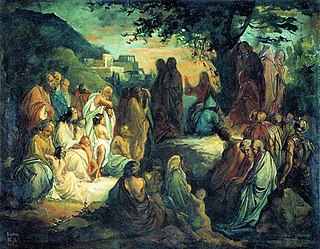Agrapha are sayings of Jesus that are not found in the canonical Gospels. The term was used for the first time by J.G. Körner, a German Bible scholar in 1776.

Matthew 6:10 is the tenth verse of the sixth chapter of the Gospel of Matthew in the New Testament and is part of the Sermon on the Mount. This verse is the second one of the Lord's Prayer, one of the best known parts of the entire New Testament. This verse contains the second and third petitions to God.

Matthew 5:15 and Matthew 5:16 are the fifteenth and sixteenth verses of the fifth chapter of the Gospel of Matthew in the New Testament. They are part of the Sermon on the Mount, and is one of a series of metaphors often seen as adding to the Beatitudes. The previous verse compared the disciples to a City upon a Hill that can't be hidden. These verses present a similar analogy.

Matthew 5:21 is the twenty-first verse of the fifth chapter of the Gospel of Matthew in the New Testament and is part of the Sermon on the Mount. It opens the first of what have traditionally been known as the Antitheses in which Jesus compares the current interpretation of a part of Mosaic Law with how it should actually be understood. This verse begins the discussion of murder.

Matthew 5:22 is the twenty-second verse of the fifth chapter of the Gospel of Matthew in the New Testament and is part of the Sermon on the Mount. It is the first of what have traditionally been known as the 6 Antitheses. In this one, Jesus compares the current interpretation of "You shall not murder" from the Ten Commandments with his own interpretation.

Matthew 5:25 is the twenty-fifth verse of the fifth chapter of the Gospel of Matthew in the New Testament and is part of the Sermon on the Mount. In this first of the 6 Antitheses Jesus has been attacking anger and advocating reconciliation. In this verse he states that it is prudential to quickly reach agreement with one's adversary.

Matthew 6:1 is the first verse of the sixth chapter of the Gospel of Matthew in the New Testament and is part of the Sermon on the Mount. This verse begins the discussion of how even good deeds can be done for the wrong reasons.

Matthew 6:5 is the fifth verse of the sixth chapter of the Gospel of Matthew in the New Testament and is part of the Sermon on the Mount. This verse opens discussion on the proper procedure for praying.

Matthew 6:6 is the sixth verse of the sixth chapter of the Gospel of Matthew in the New Testament and is part of the Sermon on the Mount. This verse continues the discussion on the proper procedure for praying; that is, not to do it in public, but to do it in private.

Matthew 6:7 is the seventh verse of the sixth chapter of the Gospel of Matthew in the New Testament and is part of the Sermon on the Mount. This verse continues the discussion on the proper procedure for praying.

Matthew 6:18 is the eighteenth verse of the sixth chapter of the Gospel of Matthew in the New Testament and is part of the Sermon on the Mount. This verse concludes the discussion of fasting.

Matthew 6:33 is the thirty-third verse of the sixth chapter of the Gospel of Matthew in the New Testament and is part of the Sermon on the Mount. This verse continues the discussion of worry about material provisions.

Matthew 7:1 is the first verse of the seventh chapter of the Gospel of Matthew in the New Testament and is part of the Sermon on the Mount. This well-known verse begins the discussion of judgmentalism.

Matthew 7:3 is the third verse of the seventh chapter of the Gospel of Matthew in the New Testament and is part of the Sermon on the Mount. This verse continues the discussion of judgmentalism.

Matthew 7:7–8 are the seventh and eighth verses of the seventh chapter of the Gospel of Matthew in the New Testament and is part of the Sermon on the Mount. These verses begin an important metaphor generally believed to be about prayer.

Matthew 7:12 is the twelfth verse of the seventh chapter of the Gospel of Matthew in the New Testament and is part of the Sermon on the Mount. This well known verse presents what has become known as the Golden Rule.

Matthew 7 is the seventh chapter of the Gospel of Matthew in the New Testament. The chapter is the last of the three chapters which comprise the Sermon on the Mount.

Matthew 7:22 is the twenty-second verse of the seventh chapter of the Gospel of Matthew in the New Testament and is part of the Sermon on the Mount. This verse continues Jesus' warning against false prophets.

Matthew 7:23 is the twenty-third verse of the seventh chapter of the Gospel of Matthew in the New Testament and is part of the Sermon on the Mount. This verse continues Jesus' warning against false prophets.

The Mote and the Beam is a parable of Jesus given in the Sermon on the Mount in the Gospel of Matthew, chapter 7, verses 1 to 5. The discourse is fairly brief, and begins by warning his followers of the dangers of judging others, stating that they too would be judged by the same standard. The Sermon on the Plain has a similar passage in Luke 6:37–42.


















